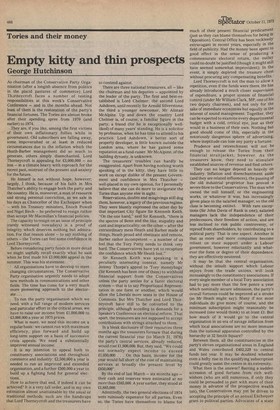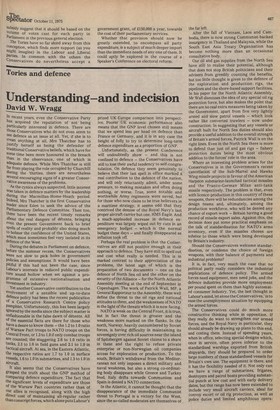Tories and their money
Empty kitty and thin prospects
George Hutchinson
As chairman of the Conservative Party Organisation (after a longish absence from politics in the placid pastures of commerce) Lord Tharneycroft faces a number of testing responsibilities at this week's Conservative Conference — and in the months ahead. Not least of them is the restoration of the party's financial fortunes. The Tories are almost broke after their spending spree from 1970 (and earlier) to 1974.
They are, if you like, among the first victims of their own inflationary follies while in government. Old subscribers are falling away, some impoverished or at least in reduced circumstances due to the inflation which the Heath-Barber management did so much to generate, others simply disenchanted. Lord Thomeycroft is appealing for £3,000,000 — no less — in a climate heavy with reproach for the recent past, mistrust of the present and anxiety for the future.
He himself is not without hope, however; largely, I think, because of his faith in Mrs Thatcher's ability to engage both the party and the country. He is, moreover, a man of resource and strong personal conviction, as we saiv in his days as Chancellor of the Exchequer when — with his Treasury ministers, Enoch Powell and Nigel Birch — he preferred to resign rather than accept Mr Macmillan's financial policies.
The capacity to resign on an issue of principle (rarely witnessed nowadays) is a proof of integrity which deserves nothing but admiration. For that reason alone — to say nothing of others — the Tories can feel some confidence in Lord Thorneycroft.
Before considering party funds in more detail we might usefully recall exactly what he said when he first' made his £3,000,000 appeal in the summer. This was his statement:
' All organisations have to develop to meet changing circumstances. The Conservative
Party organisation urgently needs to adopt new methods in communications and other fields. The time has come for a very much more pioneering approach to the electorate ...
To run the party organisation which we need, with a full range of modern services and particular effort in the critical areas, we have to raise our income from £1,000,000 to £3,000,000 a year at 1975 prices.
What is more, we need this income on a regular basis : we cannot run with maximum efficiency, plan forward and build up long-term support on a basis of successive crisis appeals. We need a substantially improved annual income.
It is my intention to appeal both to constituency associations and throughout commerce and industry: £2,500,000 a year is needed to run an improved and extended organisation, and a further £500,000 a year to build up a fighting fund for general elections.
How to achieve that end, if indeed it can be achieved? It is a very tall order, and in my own estimation almost unattainable by the usual or traditional methods; such are the handicaps that Lord Thorneycroft and the treasurers have to contend against.
There are three national treasurers, all — like the chairman and his deputies — appointed by the leader of the party. The first and best-established is Lord Chelmer; the second Lord Ashdown, until recently Sir Arnold Silverstone; the third a younger newcomer, Mr Alistair McAlpine. Up and down the country Lord Chelmer is, of course, a familiar figure in the party, a friend (for he is exceptionally wellliked) of many years' standing. He is a solicitor by profession, when he has time to attend to his practice. Lord Ashdown, a better sort of property developer, is little known outside the London area, where he has gained some reputation as a fund-raiser. Mr McAlpine, of the building dynasty, is unknown.
The treasurers' troubles can hardly be exaggerated. Apart from having nothing worth speaking of in the kitty, they have little to work on except dislike of the present Government and confidence in Mrs Thatcher — well-placed in my own opinion, for I personally' believe that she can do more to invigorate the Tories than anyone else in sight.
Reservations, doubts and misgivings still dog them, however, a legacy of the previous regime. They were bluntly expressed the other day by that important City figure Sir Kenneth Keith, "On the one hand," said Sir Kenneth, "there is the spectre of Benn and the like, stupidity and cant and impracticality; on the other — after the extraordinary mess Heath and Barber made of things, Heath proud and obstinate and remote, Barber rather incompetent — a number of us feel that the Tory Party needs to think very hard. The Conservatives have yet to recapture the confidence which Mr Heath lost."
Sir Kenneth Keith was speaking in a peculiarly interesting context, namely Mr Jeremy Thorpe's appeal to 'Tory moneybags' (Sir Kenneth has been one of them) to withhold financial support from the Conservatives unless the party settles for a fairer electoral system — that is to say Proportional Representation in one form or another, which would allow the Liberals more seats in the House of Commons. But Mrs Thatcher and Lord Thorneycroft have still to be converted to the principle, although acceding to demands for a Speaker's Conference on electoral reform. That apart, the treasurers are not supposed to accept contributions with strings attached to them.
In a bleak disclosure of their resources three months ago the treasurers foresaw that during the current financial year (to March 31, 1976) the party's central services, already reduced, would cost £1,900,000. But, they said, "We could not normally expect income to exceed £1,050,000 . . On this basis, income for the year would fall short of the cost of maintaining services at broadly the present level by £850,000".
By the end of last March — six months ago — their cash and reserves were estimated at no more than £585,000. A year earlier, they stood at E1,865,000.
Admittedly, the two general elections of 1974 were ruinously expensive for all parties. Even so, the Tories have themselves to blame for much of their present financial predicament (just as they can blame themselves for being in Opposition). Central Office has been recklessly extravagant in recent years, especially in the field of publicity. Had the money been spent to good effect in the sense of producing a commensurate electoral return, the outlay could no doubt be justified (though it might still have seemed somewhat improvident). In the event, it simply depleted the treasure chest without procuring any compensating benefits. Lord Thorneycroft is not the man to allow a repetition, even if the funds were there. He has already introduced a much closer supervision of expenditure, a proper system of financial control (under Mr William Clark, MP, one of his two deputy chairmen), and not only for the sake of immediate economies but equally in the interest of sound management. Together, they can be expected to examine every departmental budget with a cold, critical eye, just as they would in a business of their own. Nothing but good should come of this, especially in the notoriously ,dangerous sphere of advertising, where ineptitude can lose any party a fortune.
Prudence and retrenchment will not be enough to release the Tories from their financial straitjacket, however. As the treasurers know, they need to stimulate established sources of revenue and find others.
They can no longer depend so heavily on industry. Inflation and disenchantment aside (and they are related influences), the passing of the old industrial proprietor has proved a severe blow to the Conservatives. The man who owned the mill himself, or the engineering works, or whatever it was, has increasingly given place to the salaried manager, so the old class is becoming extinct. With rare exceptions (Sir John Davis of Rank is one), salaried managers lack the independence of their predecessors, their freedom of action, and are less inclined to risk public controversy, or reproof from shareholders, by contributing to a political party. That is one aspect. Another is that as more and more companies become reliant on state support under a Labour government, however reluctantly and whatever the form or degree of their dependence, they are effectively neutered.
It may be that the central organisation, without the inbuilt support which Labour enjoys from the trade unions, will look increasingly to the constituency associations. If every single member of a local Tory association had to pay more than the few pence a year which nominally secure admission, the party's overall fortunes could be improved at a stroke (as Mr Heath might say). Many if not most individuals do give more, of course, and the minimum subscription might reasonably be increased (one would think) to at .least £1. But how much of it would go to the central organisation in an era of savage inflation from which local associations are no more immune than the national apparatus controlled by the hierarchy at 32 Smith Square?
Between them, all the constituencies in the party's eleven organisational areas in England and Wales contributed £402,329 to central funds last year. It may be doubted whether even a hefty rise in the qualifying subscription could greatly assist the centre in its extremity.
What then is the answer? Barring a •sudden accession of good fortune from rich wellwishers (who are still numerous, if only they could be persuaded to part with more of their money in advance of the prospective wealth tax),. the Conservatives may yet be driven to accepting the principle of an annual Exchequer grant to political parties. Advocates of a state subsidy suggest that it should be based on the volume of votes cast for each party in Parliament in the previous general election. The Tories have so far shied away from this conception, which finds more support (as you might imagine) in the Labour and Liberal Parties. In common with the others the Conservatives do nevertheless accept a government grant, of 6150,000 a year, towards the cost of their parliamentary services.
Whether that provision should now be greatly extended, to encompass all party expenditure, is a subject of much deeper import than the immediate needs of any one of them. It could aptly be explored in the course of a Speaker's Conference on electoral reform.



































 Previous page
Previous page